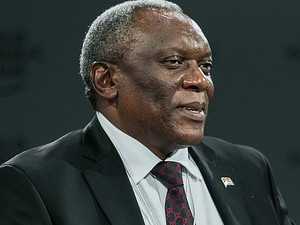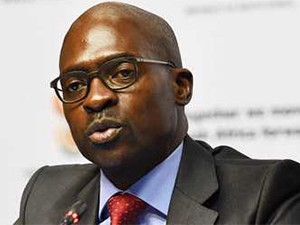
Telecommunication and postal services minister Siyabonga Cwele says government will soon establish a task team to engage Telkom on the sale of a portion of its shares, to avoid a risk of an expenditure ceiling breach of R3.9 billion.
This after finance minister Malusi Gigaba announced yesterday as part of his 2017 Medium-Term Budget Policy Statement that a portion of government's 39% stake in the telco would be sold, after months of speculation.
"The expenditure ceiling is threatened in the current year, as a result of government's recapitalisation of South African Airways (SAA) and the South African Post Office (SAPO). Government is disposing of a portion of its Telkom shares to avoid a breach, with an option to buy them back at a later stage," Gibaba said.
The expenditure breach risk was brought about by the recapitalisation of SAA and SAPO amounting to R13.7 billion, according to a government statement.
Telkom's market cap today was sitting at around R28.5 billion, making government's 39% stake worth just over R11 billion.
Cwele backed up Gigaba, saying government decided to sell the Telkom shares instead of borrowing to fill the hole in order to maintain fiscal discipline.
"So the strategy is to use whatever money we have to cut down the debt and invest in key strategic assets ? our state-owned companies. That is the approach we are taking with the post office, so that we continue to respect our expenditure ceiling and fiscal discipline," according to Cwele.
Choices
"Under difficult times, you look [at] whether you should borrow or dispose of existing assets or a portion [of the assets]. As a country, we have to continue to maintain our fiscal independence and our fiscal discipline. We don't want to send minister Gigaba to international institutions for funding... We are basically leveraging on our existing assets. We are not privatising Telkom," Cwele adds.
However, analysts don't believe this is the most prudent fiscal decision.
Arthur Goldstuck, MD of World Wide Worx, says the possibility of the sale in order to shore up SAA was always on the cards, "but always seen as a poor solution".
"The fairly general consensus has been that they would be selling a profitable, healthy operation to fund an unprofitable, ailing operation. The obvious solution is to sell the ailing operation to an entity that is able to turn it around."
Goldstuck says that "aside from a few blips, Telkom has been enormously profitable for government".
"It is the jewel in the crown of state-owned enterprises (SOEs): well run and strategically managed."
Denis Smit, consulting director at BMI-TechKnowledge, also believes the sale makes no sense.
"Selling the silverware to prop up these SOEs is simply not prudent financial management," says Smit. "This is not addressing the real problems but simply kicks the can up the road."
"Disposing of shares is every investor's prerogative, even if that investor is government," according to George Kalebaila, director for telecoms and Internet of things in Africa at IDC.
"However, what is maybe making this decision a little contentious is that the proceeds will be used to bailout perennial non-performing government assets such as SAA and SAPO.

"If government was using the proceeds to invest in other social programmes such as housing, education, etc, it would have been easier to digest. Hopefully, the new board and new management at SAA will make good use of this investment and prove most of us wrong that it is an asset worth protecting," says Kalebaila.
"Unless the government is serious about radically reforming these state assets, it will be throwing a lot of good money (that could be better spent elsewhere) after a lot of good taxpayers' money already wasted," says Dobek Pater, MD of Africa Analysis.
"But the government still needs additional funds for various expenses, so unfortunately (for the government) it has come to a point where it needs to start selling some of its better performing assets," Pater adds.
Bottomless pit
What is making the sale a hard pill for most to swallow is that money from a strong government asset will be used for loss-making SOEs.
According to SAA's integrated report for the year ended 31 March 2016, it reported a loss of R1.5 billion that year and a loss of R5.6 billion in the previous year. Last month, National Treasury had to give SAA R3 billion in emergency funds to help it repay loans to Citibank. Reuters says this brings transfers to the ailing national carrier to more than R5 billion in the last two months.
"It makes little economic sense to hold onto SAA while selling Telkom. One can only see it as either a matter of national pride or of a strategic intent that is hidden from the market and the public. We have seen little explanation or justification why it is so important to hold onto SAA and pour billions into it year after year, unless there is a hidden agenda. National pride is not a very convincing one," says Goldstuck.
However, Goldstuck believes the post office is a different story.
"Especially with its natural role in processing social grants, SAPO has a developmental role to play in South Africa. As a result, government should be investing in its capacity to provide a wide range of services to the public. It is a matter of national capacity rather than national pride," he says.
The post office saw a loss before tax of R959 million for the financial year ended 31 March 2017. It had reported a loss of R 1.1 billion the previous year. In the year ended 31 March 2017, SAPO's revenue declined 4%, to R4.54 billion. It also had an operating loss of R807 million in 2017 and R973 million in 2016.
Blessing in disguise
In terms of what the sale would mean for Telkom, Kalebaila says it might be a blessing in disguise.
"With less government shareholding, Telkom will be less beholden to government pressure and act more decisively in the market. However, that government will exercise the option to buy back the shares at some point in the future might be a dampener of sorts. Hopefully, government will be able to afford the shares, especially if Telkom continues on its upward surge following the turnaround in the past few years," Kalebaila adds.
Goldstuck says the sale would free Telkom to pursue partnerships, alliances and investments that weren't possible before.
"For example, they could once again look at an entity like Korea Telecoms taking a stake. Government intervention stopped that last time round, in one of the worst examples we have seen of state interference setting back infrastructure evolution and business development. It remains one of the big strategic errors of South African business."
Investor fears
It's still unclear how much of the government stake will be sold. Telkom told ITWeb it "cannot comment on shareholder movements".
On 30 August, Telkom confirmed via the Stock Exchange News Service (SENS) that government was considering selling part of its stake, but in early October withdrew the previous cautionary announcement saying it was "not aware of any current decision taken by the government with regards to its shareholding".
Yesterday, after Gibaba's speech, Telkom issued a SENS statement which quoted the minister, adding it "is not aware of any further details".
Smit says the back and forth on the sale is concerning and "simply messes with the investment community and places Telkom in an awkward position in terms of its compliance with JSE rules".
"Telkom is undeniably the best-run SOE and the share price growth this last year has shown that. This apparently uncoordinated announcement will possibly adversely affect the share price and consequently government may in fact get less than it should for the shares, as buyers will believe government has no choice," adds Smit.
The share price fell after the announcement yesterday and was down this morning by almost another 1%, trading at R54.14 per share at 11:30 CAT.
Share